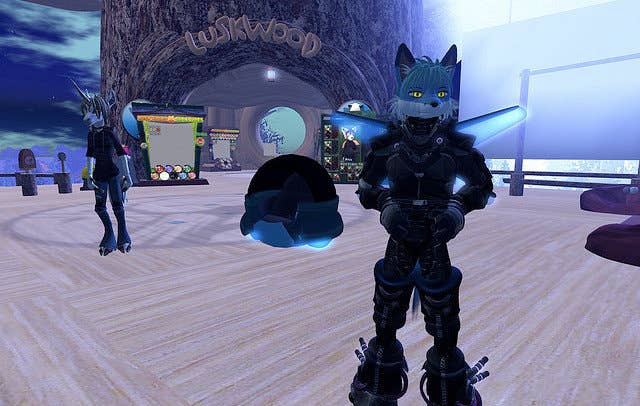Linden Lab: "The Weirder The Better"
Rod Humble and Emily Short on Second Life's second chance and broadening Linden Lab's horizons
For a brief period the whole world seemed to be fascinated with Second Life. In 2006 and 2007, Linden Lab's online society was the recipient, and perhaps the victim, of intense media scrutiny. The population was booming, Linden dollars could be traded for real-world currencies, millionaires were made, global brands like Adidas and Nike opened virtual stores, Reuters embedded a reporter to find virtual news.
By 2008 Second Life's star had begun to fade. The shops started to close, the news agencies backed away, and Wired was more interested in online worlds that didn't feature 3D avatars. Linden Lab still had millions of registered accounts, but a relatively slim percentage chose to return on a regular basis; MySpace gave way to Facebook, and a very different social revolution began in earnest.
I was taken aback by just how big Second Life was. This is a world that has got 1 million people logging in every month, generating well in excess of $75 million a year
Rod Humble, CEO, Linden Lab
In June 2010, Linden Lab cut 30 per cent of its workforce. As the month drew to a close, CEO Mark Kingdon stepped down.
Indeed, when veteran developer Rod Humble accepted the offer to become Linden Lab's new CEO at the start of 2011, he hadn't paid close attention to Second Life, the company's only product, for some time. Humble had worked on several major franchises in his distinguished career, but while he knew the name well, the reality was another matter.
"I was taken aback by just how big Second Life was," he recalls. "To be honest, it had fallen off my radar until I got the call offering me the position. And I looked at their numbers: this is a world that has got 1 million people logging in every month, generating well in excess of $75 million a year - it's extremely profitable - and it was the kind of company and the kind of product that I had been thinking about going away and working on anyway, on my own. It was kind of a perfect fit."
But the experience of Second Life was far from perfect. There was still a passionate community of regular visitors and a strong internal economy, but new users found it too difficult to grasp the fundamentals of the world. People signed up and people walked away, so Humble made that problem his highest priority.

"I've walked into big franchises before, and the very nature of big franchises is once you're inside the Cathedral you tend to tune out things like the rickety stairs, the door that squeaks. So in the first year, just because the product had been out for a long time, I wanted emphasis on usability, service, and starting to get the basics right."
"There are some UI methodologies - from the sign-up process to moving around the world - that I thought could be helpful. And they were. We managed to grow the new users significantly: they bumped up by well in excess of 40 per cent, and over the holiday period we had over 20,000 new people sign up a day. Now, that's not Facebook numbers, but 20,000 a day.... that's a lot, right?"
Humble's list of credits includes two of the most innovative franchises of the last 20 years: EverQuest and The Sims. A game developer may not seem like the obvious choice to lead a company like Linden Lab, but on close inspection the ideas that powered those games to global success could take Second Life in exciting new directions.

Ultimately, the evolution of that world will be in the hands of its residents, and now that Humble's team has spent a year making the current experience more intuitive and accessible, the next year will be devoted to providing better tools to shape its future. At present, creation is the third most popular activity behind socialising and listening to music in the various bars and nightclubs - contrary to popular belief, Second Life isn't just one big virtual orgy. For Humble, this is just proof that the existing creation tools aren't good enough.
"This year the focus is adding more life to the world - artificial life, things like path-finding which hadn't existed before - and then enabling a suite of tools that will allow people to make things like their own massively multiplayer role-playing game."
"They do already kinda, but it's really hard, so we're going to release a suite of tools that will make it very, very easy to say, 'You know what, I'm going to make a fantasy role-playing game. I've bought this area of land, and now I'm going to plant my trees, and now I'm going to put some monsters on, and here's the UI that's going to appear when you go in, and when you hit a monster you get this many experience points'."
"That's one application, but my hope is that, with these tools, because we make them so broad, people will make things that are a lot more interesting than fantasy role-playing games... The great thing about making software tools is that you don't know what people are going to make. That was part of the reason why, late last year, I asked Will Wright to join our board. So he can help direct me when it comes to some of these crazy ideas, because there's certainly nobody better than him in terms of having a good eye for finding the best kind of tool."
And there are larger changes afoot. Linden Lab has been in business for 13 years with a single product, but 2012 will bring that trend to a close. Humble says that, from the very beginning, one of his main goals as CEO was to "put the 'lab' back into Linden Lab" - to make the company synonymous with original and innovative ideas rather than one monolithic product.

The company's recent acquisition of the independent studio LittleTextPeople is a key part of that process. Founded by Emily Short, an influential figure in the field of interactive fiction, and Richard Evans, the lead AI designer on The Sims 3, LittleTextPeople was developing a concept that combined the kind of simulation found in The Sims with actual social interaction and interactive storytelling.
"It was more about how do people treat each other, what do they say to each other, rather than when do you need to go to the bathroom, when do you need to clean the house, and those sort of topics," Short says.
"Richard and I both felt strongly that there was something here that we, as a team, were uniquely positioned to do, and that we were really interested in. Both of us had opportunities to work on other kinds of projects, but we were really excited about the potential of this and how essentially unexplored some of these ideas seem to be so far."
"I'm very comfortable with that label of, 'Are you guys really in the games business?' That's a good question. It shows that we're elbowing around the edges, which is where I like to be
Rod Humble, CEO, Linden Lab
Humble had known both Short and Evans for many years, and he had first-hand knowledge of Evans' abilities from his time working on The Sims. When he saw what LittleTextPeople were working on at the end of last year, its relevance to Linden Lab's new direction was immediately apparent. Fortunately, Short and Evans felt the same way.
"If you're creating good stories through games you want to allow the user's engagement with the narrative to be partially creative as well," Short says. "There are all sorts of questions about how you do that, and the approach that Linden Lab has to those sorts of issues is a really good fit for us."
The LittleTextPeople team is now working on "a version" of that same concept. The key difference is that they now have access to Linden Lab's technical and financial resources, giving Short and Evans more time to concentrate on their areas of expertise and push the idea forward.
It will be one of three new Linden Lab products to be announced this year, and Humble seems anxious to reach the point where he can begin talking about them in more detail - not least because describing them without the details is surprisingly difficult. According to Humble, their inscrutable nature is indicative of the innovation in each one.
"In the case of Emily and Richard's [project] there is text, but there's also icons, and choices, and there's also 2D graphics," he says. "Part of the reason I asked them to join the company is when I saw it work and I played it, it felt really new and fresh. It felt like I was part of a shared story, and I had never had an experience like it before. It does involve reading, and that's a plus to me - reading is great when it's good writing. I just fell in love with actually being involved in a story in a really new way that I hadn't before."

"Although it will launch with some very, very well crafted content, the overall plan - just like all Linden lab products - is to democratise the actual creation process. Other people will be able to make things on that platform. That's really the business we're in: building platforms that allow people to express themselves in different ways."
"You can view Second Life as a shared 3D creation space; the product LittleTextPeople is working on is going to be a creative shared storytelling space, where you can make your own stories and have people share them and play them. And then the two other products, certainly one fits very much in with virtual worlds, and the other one is kind of a unique, weird thing again that is even harder to describe - actually, it's much harder to describe."
One thing is clear: like Second Life, Linden Lab's trio of new products won't comfortably fit in with our common perception of video games. Indeed, they won't necessarily cohere to our understanding of virtual worlds, either. But for Humble, any difficulty people have with applying labels is a strong indication that he is heading in the right direction.
"With many people who work at Linden Lab, and ones who are about to join, they are people who have pushed at the edges of the games business and what games can be," he says. "I'm very comfortable with that label of, 'Are you guys really in the games business?' That's a good question. The more that occurs the better, I think. It shows that we're elbowing around the edges, which is where I like to be."
"Linden Lab has been very successful with one innovative product, but I want to stretch the company out again, to make it a really exciting place where people can't wait to find out about the next unusual title we're going to release. For me, generally, our [business] is shared creative spaces; that's generally what the company does, but also the weirder the better, I think. If we had a motto, that would be it."

